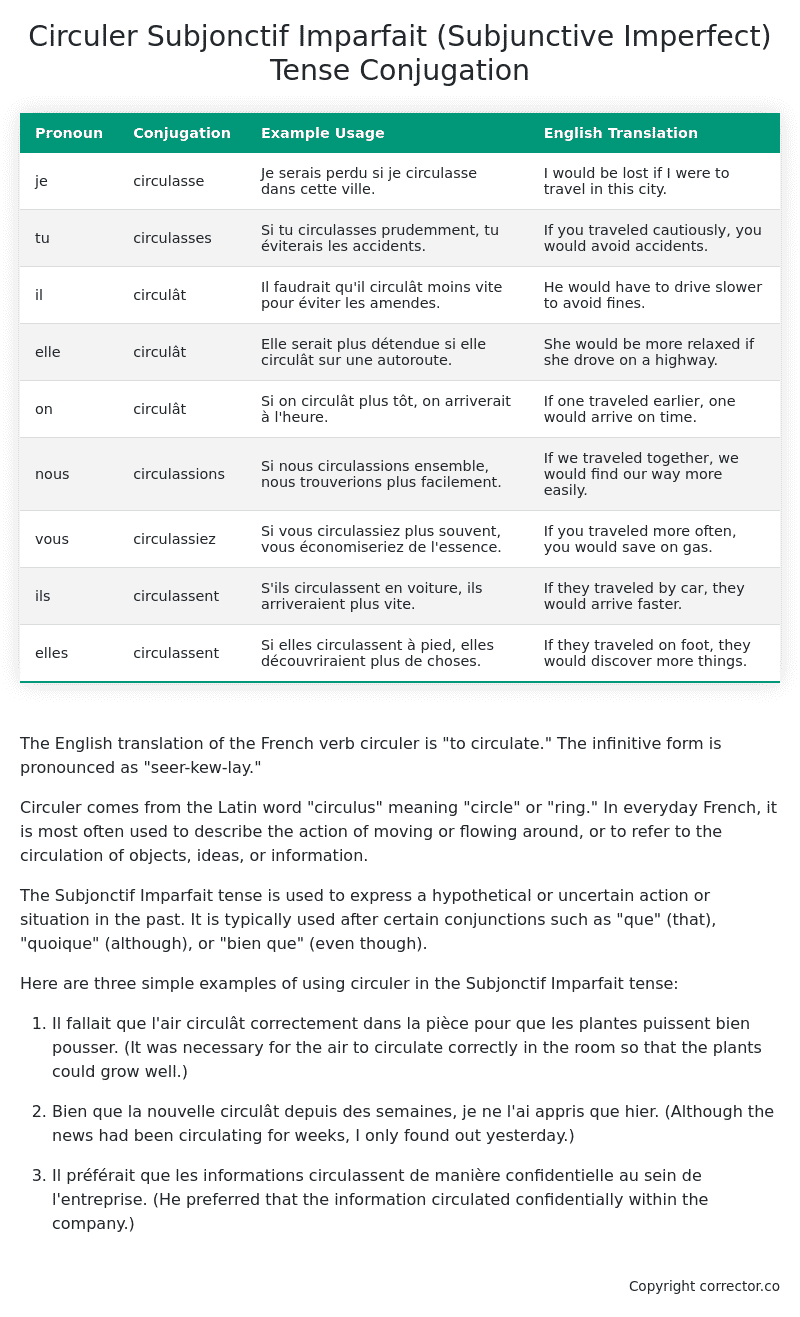Subjonctif Imparfait (Subjunctive Imperfect) Tense Conjugation of the French Verb circuler
Introduction to the verb circuler
The English translation of the French verb circuler is “to circulate.” The infinitive form is pronounced as “seer-kew-lay.”
Circuler comes from the Latin word “circulus” meaning “circle” or “ring.” In everyday French, it is most often used to describe the action of moving or flowing around, or to refer to the circulation of objects, ideas, or information.
The Subjonctif Imparfait tense is used to express a hypothetical or uncertain action or situation in the past. It is typically used after certain conjunctions such as “que” (that), “quoique” (although), or “bien que” (even though).
Here are three simple examples of using circuler in the Subjonctif Imparfait tense:
-
Il fallait que l’air circulât correctement dans la pièce pour que les plantes puissent bien pousser. (It was necessary for the air to circulate correctly in the room so that the plants could grow well.)
-
Bien que la nouvelle circulât depuis des semaines, je ne l’ai appris que hier. (Although the news had been circulating for weeks, I only found out yesterday.)
-
Il préférait que les informations circulassent de manière confidentielle au sein de l’entreprise. (He preferred that the information circulated confidentially within the company.)
Table of the Subjonctif Imparfait (Subjunctive Imperfect) Tense Conjugation of circuler
| Pronoun | Conjugation | Example Usage | English Translation |
|---|---|---|---|
| je | circulasse | Je serais perdu si je circulasse dans cette ville. | I would be lost if I were to travel in this city. |
| tu | circulasses | Si tu circulasses prudemment, tu éviterais les accidents. | If you traveled cautiously, you would avoid accidents. |
| il | circulât | Il faudrait qu’il circulât moins vite pour éviter les amendes. | He would have to drive slower to avoid fines. |
| elle | circulât | Elle serait plus détendue si elle circulât sur une autoroute. | She would be more relaxed if she drove on a highway. |
| on | circulât | Si on circulât plus tôt, on arriverait à l’heure. | If one traveled earlier, one would arrive on time. |
| nous | circulassions | Si nous circulassions ensemble, nous trouverions plus facilement. | If we traveled together, we would find our way more easily. |
| vous | circulassiez | Si vous circulassiez plus souvent, vous économiseriez de l’essence. | If you traveled more often, you would save on gas. |
| ils | circulassent | S’ils circulassent en voiture, ils arriveraient plus vite. | If they traveled by car, they would arrive faster. |
| elles | circulassent | Si elles circulassent à pied, elles découvriraient plus de choses. | If they traveled on foot, they would discover more things. |
Other Conjugations for Circuler.
Le Present (Present Tense) Conjugation of the French Verb circuler
Imparfait (Imperfect) Tense Conjugation of the French Verb circuler
Passé Simple (Simple Past) Tense Conjugation of the French Verb circuler
Passé Composé (Present Perfect) Tense Conjugation of the French Verb circuler
Futur Simple (Simple Future) Tense Conjugation of the French Verb circuler
Futur Proche (Near Future) Tense Conjugation of the French Verb circuler
Plus-que-parfait (Pluperfect) Tense Conjugation of the French Verb circuler
Passé Antérieur (Past Anterior) Tense Conjugation of the French Verb circuler
Futur Antérieur (Future Anterior) Tense Conjugation of the French Verb circuler
Subjonctif Présent (Subjunctive Present) Tense Conjugation of the French Verb circuler
Subjonctif Passé (Subjunctive Past) Tense Conjugation of the French Verb circuler
Subjonctif Imparfait (Subjunctive Imperfect) Tense Conjugation of the French Verb circuler (this article)
Subjonctif Plus-que-parfait (Subjunctive Pluperfect) Tense Conjugation of the French Verb circuler
Conditionnel Présent (Conditional Present) Tense Conjugation of the French Verb circuler
Conditionnel Passé (Conditional Past) Tense Conjugation of the French Verb circuler
L’impératif Présent (Imperative Present) Tense Conjugation of the French Verb circuler
L’infinitif Présent (Infinitive Present) Tense Conjugation of the French Verb circuler
Struggling with French verbs or the language in general? Why not use our free French Grammar Checker – no registration required!
Get a FREE Download Study Sheet of this Conjugation 🔥
Simply right click the image below, click “save image” and get your free reference for the circuler Subjonctif Imparfait tense conjugation!

Circuler – About the French Subjonctif Imparfait (Subjunctive Imperfect) Tense
Formation
Common Everyday Usage Patterns
Interactions with Other Tenses
Subjonctif Présent
Indicatif Passé Composé
Conditional
Conditional Perfect
Summary
I hope you enjoyed this article on the verb circuler. Still in a learning mood? Check out another TOTALLY random French verb conjugation!


